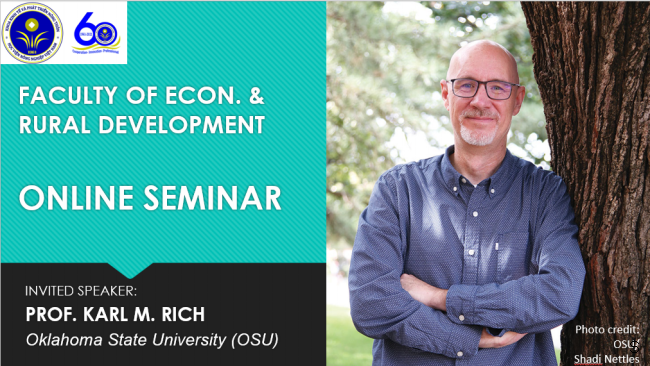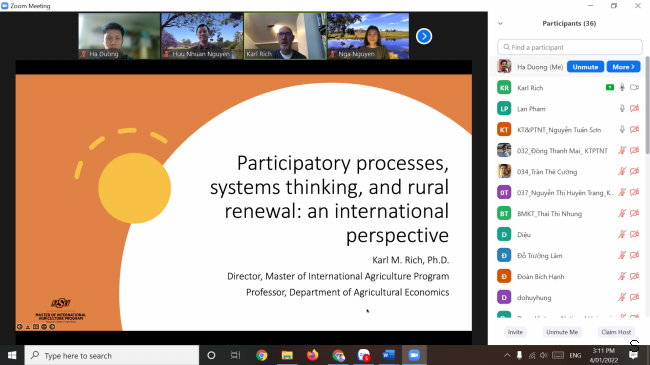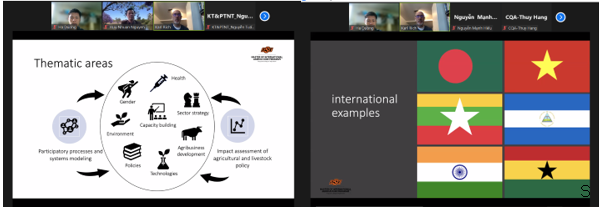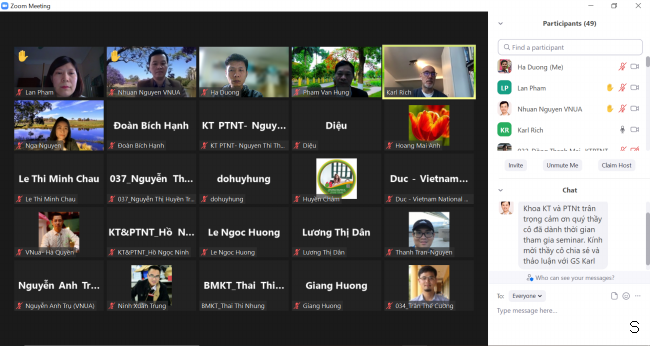On the afternoon of January 4, 2022 on the online forum (on the Zoom platform) of the Faculty of Economics and Rural Development, Vietnam National University of Agriculture (VNUA) held a webinar entitled "Participatory processes, systems thinking, and rural renewal: an international perspective” presented by Prof. Karl Rich (Oklahoma State University, USA), the guest speaker of the Economic Linkages and Market Development Strong Research Group. This is the forum to share scientific research methods and experiences of the lecturers, researchers and postgraduate students of the Faculty as well as guest experts.

Professor Karl Rich is the Professor of Agricultural Economics, Director of the Master of International Agriculture Program at the Ferguson College of Agriculture at Oklahoma State University (OSU, USA). He is a leading prestigious expert in the world (Google Scholar: 3348 citations, h-index = 31) with more than 20 years of international research, teaching and consulting experience in many developed and developing countries. Before working at OSU, Prof. Karl Rich was a Senior Economist for the International Livestock Research Institute (ILRI), Associate Professor at Lincoln University (New Zealand), the Norwegian Institute of International Affairs (in Oslo), the Department of Economics at the American University in Cairo, the South Asia Office of the International Food Policy Research Institute (IFPRI, in New Delhi, India) and the United States International Trade Commission (in Washington DC).
Attending the webinar, there were the Dean of the Faculty of Economics and Rural Development (VNUA), including Assoc. Prof. Dr. Nguyen Thi Minh Hien, Dean of the Faculty of Economics and Rural Development; Assoc. Prof. Dr. Nguyen Mau Dung, Vice Dean the Faculty of Economics and Rural Development; Dr. Nguyen Huu Nhuan, Vice Dean the Faculty of Economics and Rural Development; Dr. Nguyen Anh Tru, Vice Dean of the the Faculty of Accounting and Business Management (VNUA), and a large number of lecturers and researchers from the two faculties. The program was chaired by Assoc. Prof. Dr. Nguyen Thi Duong Nga, a scientist with extensive experience in researching and implementing domestic and international agricultural and rural development projects of the Faculty of Economics and Rural Development (VNUA).

The webinar on the Zoom platform (Photo: Duong Nam Ha – VNUA)
Opening the webinar, Dr. Nguyen Huu Nhuan, on behalf of the organizing committee, introduced the content, meaning, purpose, requirements and speakers of the webinar. Following that, Prof. Karl Rich gave the presentation. The professor introduced the context of research and development projects using a systems thinking approach and participatory processes associated with agricultural development policy assessment. The methods mentioned could be applied at the household level or the value chain level.
Group model building includes three components: systematic thinking, model building, and community engagement. At that time, the concept of a team is important, in which the stakeholders are not experts but farmers, traders, veterinarians who can create co-constructive models. Experts can join reference groups to review the model.

Some theoretical topics and practical examples in developing countries presented in the presentation (Photo: Duong Nam Ha – VNUA)
To better explain the group modelling method, Prof. Karl Rich used many examples from his research in various developing countries from Africa to Asia, including the pork value chain in Vietnam. To illustrate teleworking in difficult conditions such as Covid-19, the speaker told how one of his PhD students implemented an iSee web-based interactive interface to receive suggestions from many experts to perfect the model in Nicaragua. In another example, his research team collected data through an online platform with the projects in Ghana and Timor Leste.

Some theoretical topics and practical examples in developing countries presented in the presentation (Photo: Duong Nam Ha – VNUA)
To better explain the group modelling method, Prof. Karl Rich used many examples from his research in various developing countries from Africa to Asia, including the pork value chain in Vietnam. To illustrate teleworking in difficult conditions such as Covid-19, the speaker told how one of his PhD students implemented an iSee web-based interactive interface to receive suggestions from many experts to perfect the model in Nicaragua. In another example, his research team collected data through an online platform with the projects in Ghana and Timor Leste.

The discussion after the presentation attracted many participants (Photo: Duong Nam Ha – VNUA)
After the presentation, the webinar participants raised many questions to discuss about the content of the presentation and the participatory systems thinking model method. Using the dynamic model as a visualization tool that combines different map data layers could facilitate the exchange and collection of information for the model. The representativeness in building the model design group was also a factor that needs attention and must be ensured. Prof. Karl Rich also emphasized that it took quite a long time to prepare before agent workshops and group meetings could be conducted. Another difficulty was that sometimes the research team could not obtain enough information for the model based on group discussions alone. In addition, the combination of quantitative and qualitative data was also very important and depended on the requirements of each stage to balance the methods and data to take advantage and value of each type of data
The academic webinar was lively and the participants all felt that the information was very useful, highly academic as well as widely applicable in many fields of research. The webinar chairwomen, Assoc. Prof. Dr. Nguyen Thi Duong Nga summarized the general issues as well as the conclusions after the discussions. At the end of the webinar, Dr. Nguyen Huu Nhuan, representative of the Faculty of Economics and Rural Development, thanked the speaker and suggested future cooperation directions in both training and scientific cooperation.